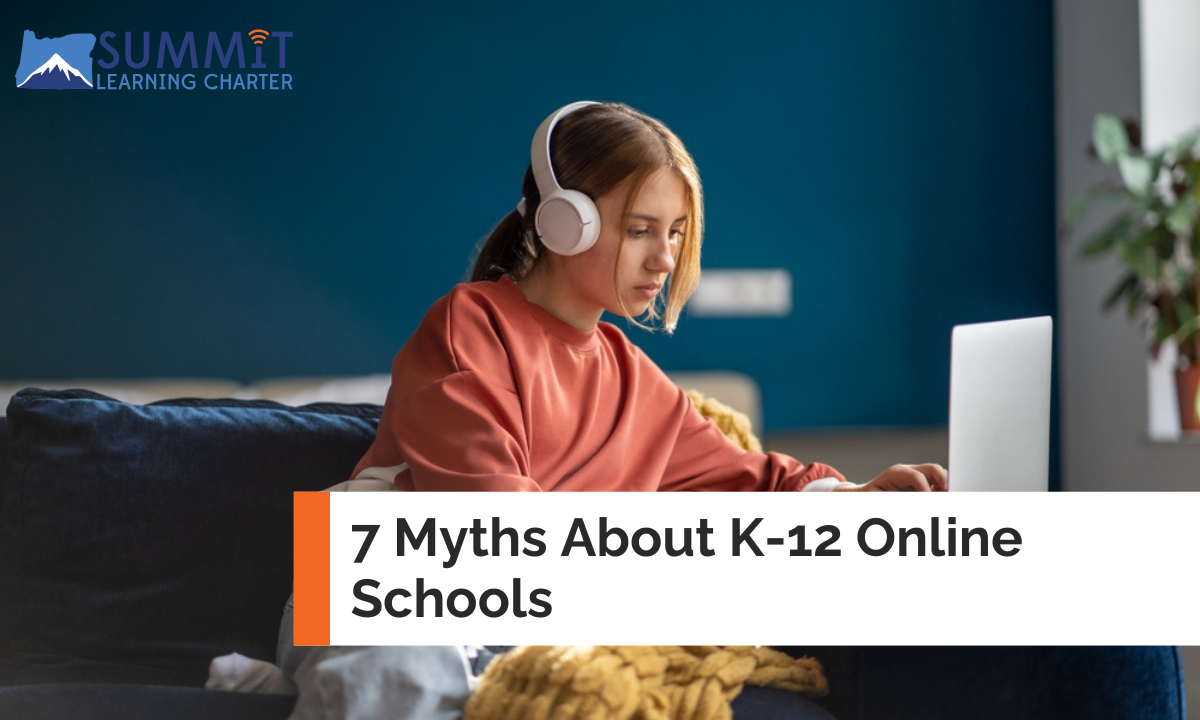
7 Myths About K-12 Online Schools
After the pandemic, people have become more accepting of working and studying online.
More and more families are exploring alternatives to traditional brick-and-mortar schools and turning to virtual charter schools. Unfortunately, there are many K-12 online school myths out there regarding things like academic rigor, socialization, and screen time.
But these misconceptions are truly nothing more than myths. Let’s take a closer look at the online school facts to debunk these myths and understand how online education can be a valuable option for students.
Myth #1: Online Schooling is Easier Than Traditional Schooling
This is a very common myth when it comes to online education. A lot of people think that when kids are studying at home, things will be easier – that studying online means their education won’t be as rigorous as in traditional school. But that couldn’t be further from the truth. Online schooling is not easier than traditional schooling, and in many ways, can even be more challenging.
When studying online, students don’t rely solely on teacher-led instruction. Students need to be disciplined and develop their time management and organizational skills since most of their learning is self-paced and guided.
Students who study online become independent, resilient learners, equipped with the right skills to manage their education – skills that are not only academic but also highly practical for higher education and the workforce.
Myth #2: Online Students Miss Out on Socialization

This myth is easy to understand. When students study from home, they do miss out on some social interactions that they would have if studying in-person with their colleagues. But that doesn’t mean they’re missing out on socialization.
Online schools are dedicated to creating engaging communities where students can connect with their peers. Through clubs, group projects, virtual meet-ups, and even in-person field trips, students can still foster the same friendships and learn to work in groups as they would in traditional schools.
At Summit Learning Charter, students join vibrant communities where they connect with peers, share ideas, and build friendships. Online schooling provides a different kind of social experience, but it’s still one that lets students practice their real-world communication skills in a variety of formats.
Myth #3: Online School is Just Screen Time
Yes, it’s true that students will watch lessons and complete assignments from a computer, but this common misconception overlooks the many ways that students learn in virtual formats.
Online schools incorporate a balance of screen-based and hands-on learning experiences. These experiences include things like reading textbooks, science experiments, and art projects which students perform without their devices. Many schools also offer field trips and social enrichment opportunities for students.
Finally, since online education tends to be more flexible, you can set up your child’s learning space and schedule to include regular breaks from screens. And by blending on- and off-screen learning, students can engage with their material in a way that keeps them interested while avoiding digital fatigue.
Related: A Typical Day for a Student Attending Virtual School
Myth #4: Online School is Only for Advanced or Struggling Students
In reality, online school accommodates a wide spectrum of learners. With individualized learning plans and flexible pacing, students can progress at a rate that suits their goals and learning styles.
So, yes, if a student needs more challenging classes, they can move ahead and access future lessons. And students that may be struggling with a particular subject or concept can dedicate extra time and resources to it. But the same also applies to the range of academic levels of all the students in between.
Online education can also accommodate different learning styles, whether students learn best through visual materials, interactive discussion forums, or hands-on projects. When students work in ways that suit them best, they tend to enjoy the material much more.
Myth #5: Online Schools Don’t Offer Extracurricular Activities

Extracurricular activities are an important part of a well-rounded education. They tend to be more often associated with traditional schools, but online schools offer extracurricular activities too.
For example, at Summit Learning Charter we offer weekly in-person and virtual-based learning extracurricular activities. These activities are designed to enrich students’ learning experience through additional learning and social opportunities. These activities are supplemental to what students are doing and give them the opportunity to work with their peers. Meanwhile, field trips may include activities in various locations such as museums, wildlife centers, or other educationally relevant locations.
Students can also participate in sports, which is great for developing teamwork skills and building lifelong friendships.
Myth #6: Online Schools Don’t Meet Curriculum Requirements
This myth is in line with people thinking online schools are easier than traditional schools. But it’s just not true.
As a public charter school, Summit Learning Charters, like other online schools, must meet state and national standards and curriculum requirements.
If don’t think online students receive the same level of education as students in traditional schools, here are a few things to keep in mind:
- Summit Learning Charter is a tuition-free public charter school funded by the Oregon Department of Education.
- All our instructors meet Oregon’s state teaching qualifications. Each Summit teacher holds a license in their subject(s) through the Teacher Standards and Practices Commission.
- Students enrolled in any public charter school are expected to participate in standardized state testing in grades 3-8 and 11.
Related: How Do Colleges View Online Schools
Myth #7: Teachers Don’t Provide the Same Support in Online Schools
Students can expect the same level of support at online schools as they do in traditional schools. They still get plenty of teacher interaction time if they need help with their studies, and teachers actively engage and support them.
In many online schools, students also have access to counselors, advisors, and/or learning coaches.
Regular communication with teachers along with other professionals ensures students at online schools receive all the support they need to flourish.
Debunking Online School Myths
Online education is still relatively new, so it’s normal for there to be myths and misconceptions surrounding it. Once you understand how online learning education and schools work, it’s clear that they provide students with the same level of education as traditional schools. Online schools also have the benefit of allowing for more flexible and personalized learning.
If you’re looking for an online school for your child, consider Summit Learning Charter. We’re a fully accredited, tuition-free online public school for grades K-12 and offer personalized learning strategies and resources tailored to each student’s needs.
Reach out today to learn more about learning online with Summit Learning Charter!
